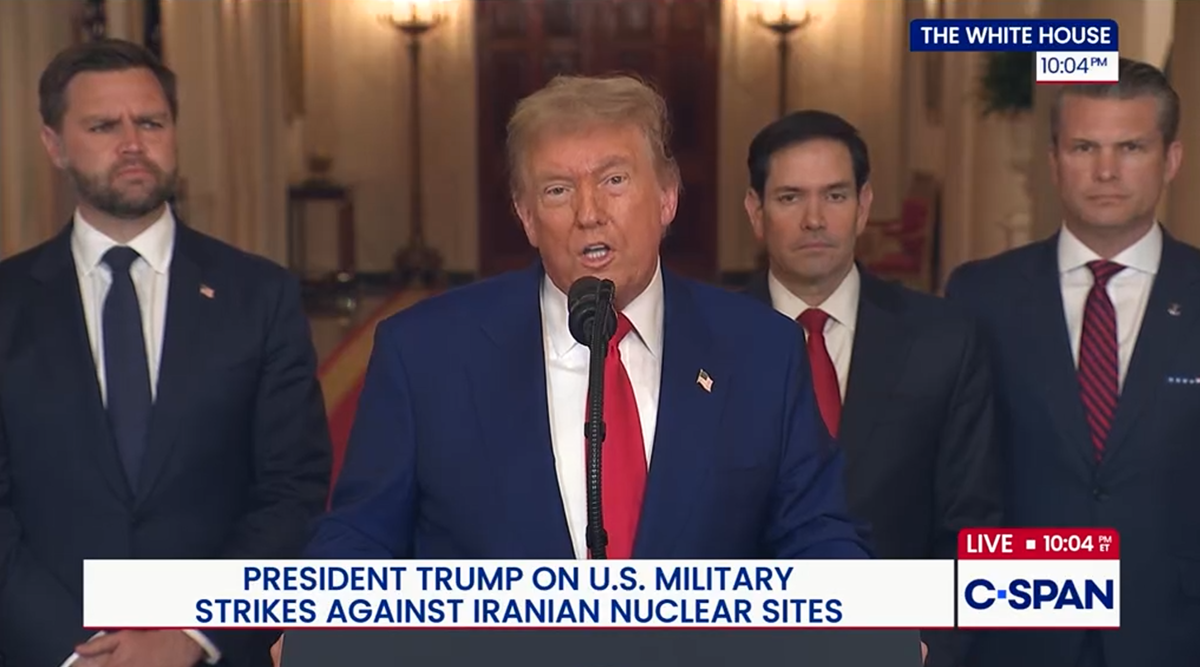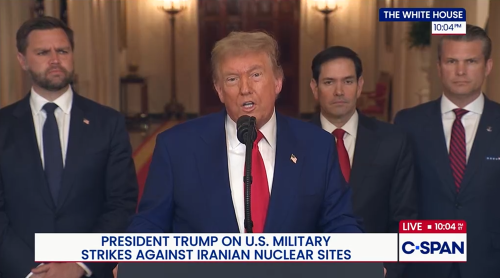
NOTE: This piece was originally published at our Substack newsletter A Public Witness.
“I want to just thank everybody and, in particular, God. I want to just say, we love you, God, and we love our great military. Protect them. God bless the Middle East, God bless Israel, and God bless America.”
With this awkwardly expressed declaration, President Donald Trump concluded his speech Saturday (June 21) explaining why he joined Israel’s war against Iran by dropping massive bombs on the country. Trump threatened Iran with more, saying that if they respond, “There will be tragedy for Iran, far greater than we have witnessed over the last eight days.” After all that, Trump thanked God for the military campaign, claimed we love God, and asked God to bless the place the U.S. had just bombed.
Let’s be clear: Dropping bombs on people doesn’t count as loving God. In the biblical book of 1 John (or is it “One John”?), we find this clearly explained to us.
“Beloved, let us love one another, because love is from God; everyone who loves is born of God and knows God. Whoever does not love does not know God, for God is love,” we read in chapter 4. “Those who say, ‘I love God,’ and hate a brother or sister are liars, for those who do not love a brother or sister, whom they have seen, cannot love God, whom they have not seen. The commandment we have from him is this: those who love God must love their brothers and sisters also.”
Loving someone would presumably mean not dropping a bomb on them. Loving someone by killing them or thinking we can achieve peace through war is akin to trying to save your marriage by having an affair (don’t try that at home). As Rev. Martin Luther King Jr. put it: “Darkness cannot drive out darkness, only light can do that. Hate cannot drive out hate, only love can do that.”
To bomb Iran, threaten more violence and death, and then proclaim love for God is to take God’s name in vain. Taking the Lord’s name in vain doesn’t really refer to cussing. It is instead a command against claiming the name of God but then not living like it.

Screengrab as President Donald Trump delivers remarks on June 21, 2025, about the U.S. attacking Iran.
Israeli Prime Minister Benjamin Netanyahu announced the start of Israel’s recent attacks on Iran by misusing a Bible verse (and by repeating claims he’s falsely made for decades about Iran’s supposed nuclear capabilities). Trump then joined this war by framing it as an act of love for God. Sadly, many Christian quickly cheered Trump’s decision to go to war and invoke God.
Turning Point USA head Charlie Kirk, who’s been mobilizing pastors to back MAGA politics, declared, “America stands with President Trump,” adding, “When Trump speaks, you should listen.” Commentator Eric Metaxas, a member of Trump’s new “religious liberty” commission, backed the attack and praised Trump for mentioning God: “President Trump just said: WE LOVE YOU, GOD. Wow. Historic. No president has ever been that bold.” Charismatic “prophet” Lance Wallnau, a Trump supporter who popularized the idea of there being “seven mountains” of society Christians should take over, said he “was moved” by Trump’s invoking of God. And controversial preacher Mark Driscoll praised Trump’s work and immediately filmed an 85-minute video pondering how it fits in with “end times prophecy.”
Listening to Trump’s attempt to call this war a sign of our love for God and seeing some prominent Christian voices quickly praising it gave me flashbacks to college as President George W. Bush prepared to invade Iraq. I led the anti-war effort on my campus, but since it was a conservative Southern Baptist school, you could fit us all in one small classroom (or probably even a supply closet). After a friend and I wrote in the college newspaper for why we shouldn’t invade Iraq, another student responded by penning a piece with a headline that flashed in my mind as Trump spoke Saturday night: “Bombs May Be the Best Love.” The basic argument was we should seek “the greater good” and force the nation open for missionary efforts, even if it means killing people. That was essentially the case for war pushed by many Southern Baptist leaders at the time, though they didn’t usually couch it so crassly as “bombs may be the best love.” The promised evangelistic revival never came. Just lots of deaths and a decimation of the historic Christian population.
Two decades later, W. Bush’s Iraq War is overwhelmingly viewed as a military, political, and moral failure. But we haven’t reckoned with that enough in our churches and denominations. Evangelicals overwhelmingly supported the invasion, believing the administration’s lies about weapons of mass destruction and, worse, pushing a violent, nationalistic theology to justify the war. Such theological chaff hasn’t been weeded out. So we now see some Christians cheering for a war that’s framed in this upside-down world as love.
When God’s name is violently taken in vain and God’s love is twisted into a distorted funhouse-mirror image, the words of singing prophet Bob Dylan are needed. In his song “With God on Our Side,” Dylan recounted various wars in U.S. history when it was said that God was “on our side” (which is basically all of them). He noted he was taught to back the wars even when “the reason for fightin’ I never did get” because “you never ask questions when God’s on your side.” The prophetic retort we need today comes at the end.
“If God’s on our side, he’ll stop the next war.”
Amen.
As a public witness,
Brian Kaylor






